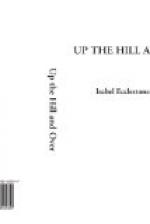“You are a strange girl, Esther. One would think you would be crazy to get away. Look at Angus! He’s going. He has suddenly found out that a trip to the Holy Land is necessary if one is to speak intelligently upon many portions of the Bible. Absurd! But I never let him dream that I know that isn’t his reason. And I hope you won’t. It is all over now and the sooner he forgets the better. But I think even you are convinced, now, that I was right about—you know to what I refer!”
Esther murmured something indistinguishable and Miss Annabel departed much pleased with her own perspicacity. And she did help. She let it be known at the Ladies’ Aid that she quite understood Esther and approved of her. After all, it was senseless to run away from trouble since trouble can run so much faster. And it was natural and right of Esther to feel that nowhere could she find so much sympathy and consideration as in her own town. Travelling was fatiguing anyway.
As for the school, that was easily arranged. A little discreet wire pulling and Esther was once more established as school mistress of District Number Fifteen. People shook their heads, but by the time of the first snowstorm they had ceased to prophesy nervous prostration, and by the time sleighing was fairly established they were ready to admit that the girl had acted sensibly after all.
No one guessed that there was another reason for Esther’s refusal to go away. It was a simple reason and had to do with the fact that in Coombe the mails were sure and regular. Travellers miss letters and strange addresses are uncertain at best, but in Coombe there was small chance of any untoward accident befalling a certain weekly letter in the handwriting of Professor Willits. Esther lived upon these letters. Brief and dry though they were, they formed the motive power of her life and indeed it was from one of them that she had received the impetus which roused her from her first trance of grief and horror.
“My dear young lady (Willits had written).
“I believe that there are times when the truth is a good thing. It might be tactful to pretend that I do not know the real reason of Calendar’s collapse but it would also be foolish. I think he is going to pull through. Now the question is—how about you? Are you going to be able to do your part?
“Let me be more explicit. It may be a long time before our friend is thoroughly re-established in health but it is quite probable that he will be well enough, and determined enough, to face some of his problems in the spring. He will turn to you. Are you going to be able to help him? When he comes to you will he find a silly, nervous girl, all horrors and regrets and useless might-have-beens or will he find you strong and sane, healthily poised, ready to face the future and let the dead past go? For the past is dead—believe me!
“You have seemed to me to be an excellently normal young person, but no doubt the shock and trouble of late events have done much to disturb your normality. Can you get it back? On the answer to that, depends Callandar’s future. I shall keep you informed, weekly, of his progress.”




